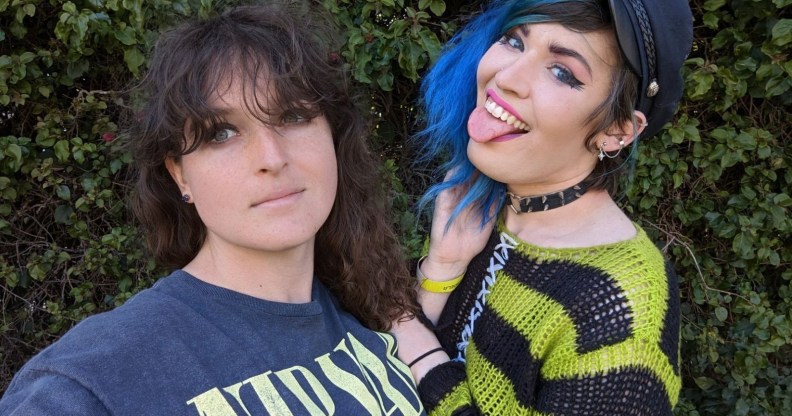The trans filmmakers on a mission to show more than just ‘trans trauma’ on screen

Mia Moore Marchant and Alexa Feeney are working together on a film about a woman stuck in a time loop for 10 years. (Credit: Twitter)
Mia Moore Marchant is sick of seeing films about trans people where their only plot line is about “coming out or getting assaulted.”
And that’s why she’s making her own movie.
She’s teamed up with friend Alexa Feeney, who are both trans, to produce the short sci-fi love story, Again Again.
They told PinkNews that showing trans stories that go beyond these tired tropes of trauma, could help improve trans representation in the media.
“I am so tired of films about trans people where the ultimate big bad antagonistic force of the film is just systemic transphobia,” Feeney said.
“We can address that queer people have trauma, but it shouldn’t be distilled into this consumable little package.”
Again Again tells the story of trans protagonist Agatha, a woman who has been through a 10-year time loop where the same day has repeated with no end in sight.
Agatha eventually breaks free and has to deal with the emotional consequences of having lived a fantastical nightmare where actions mean nothing.
Written by Marchant and directed by the pair, Again Again is an attempt to prove that trans identities can be the foundation of a captivating story that doesn’t focus on the trauma of living in an anti-trans society.

“I really respect queer indie cinema from the 1990s and 2000s, especially lesbian films, where it’s like, they’re lesbians but it’s a heist movie,” Marchant explained.
“This could be a film starring a man and a woman and the story wouldn’t be intrinsically different but it’s just a great film starring two women.”
Feeney added that, instead of the trans characters being arbitrary, their identities have directly influenced the concept of the film, while still not relying on tiring tropes that so often drag queer characters down.
“The queerness does deeply inform the characters and their choices they’re making and all of that, but it’s also not didactic in its queerness.
“It’s not like, ‘Well this is what lesbians are’. It’s just these dykes getting up to s**t.”
The film’s Indiegogo fundraiser page, which has raised more than £43,900 of its £64,000 goal, explains that “trans people’s relationship to time can be kind of weird”.
Feeney continues: “There’s so much of your life that’s spent waiting around for something – doctor’s appointments, your stressed-out friends to text you back. We wanted to dig into what it would mean to really spend that time in a purgatory that seems like it’s never going to end.”
It’s this lack of diversity in the stories trans people actually get to be part of that drives the pair’s creativity.
Of the few Hollywood films that have tried to represent trans people, such as The Danish Girl – where a cisgender man played the lead trans role – many have fallen into controversy for missing the mark or making mistakes because there is little understanding of what makes a good trans character.
Similarly, other films are so vague in their metaphors for transness, such as Synecdoche, New York – which some have argued plays around with the concept of gender identity – that they could scarcely be described as representation at all.
To bring about the era of cinema that trans people deserve, Marchant and Feeney believe there needs to be an underground scene that sets the bar similar to the legacy of maverick director John Waters and films such as Pink Flamingos.
“I want to tell the kinds of stories that we would have gotten if Hollywood gave a s**t about us 30 years ago,” Marchant said.
“If trans people were part of the indie cinema boom of the 1990s, then what kind of a story would we have gotten?
“Stories about a Groundhog’s Day scenario or a story where someone goes back in time to meet their pre-transition self, those are all the things I sort of envision us having gotten in the past 40 years, if we were allowed to exist.
“Because trans people are cool, there [are] a lot of things about identity that come to mind that isn’t the standard s**t that we’ve been seeing.
“I want to see trans movies that aren’t about coming out or getting assaulted,” Marchant said.
Feeney echoed that sentiment, saying about Again Again: “This is kind of a mic-drop, to be like, ‘Hey, have you considered other movies, because we exist and we can have movies that aren’t just about the trauma, about the medicalisation of transness.
“Sometimes we get to be goofy little critters stuck in a time loop’.”

